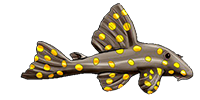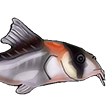/siluriformes/loricariidae/hypancistrus/sp%28l174%29/1.jpg)
/siluriformes/loricariidae/hypancistrus/sp%28l174%29/2.jpg)
/siluriformes/loricariidae/hypancistrus/sp%28l174%29/3.jpg)
/siluriformes/loricariidae/hypancistrus/sp%28l174%29/4.jpg) Male positioned outside breeding cave
Male positioned outside breeding cave/siluriformes/loricariidae/hypancistrus/sp%28l174%29/5.jpg)
/siluriformes/loricariidae/hypancistrus/sp%28l174%29/6.jpg) Close-up of male's pectoral fin
Close-up of male's pectoral fin/siluriformes/loricariidae/hypancistrus/sp%28l174%29/7.jpg)
/siluriformes/loricariidae/hypancistrus/sp%28l174%29/8.jpg)
/siluriformes/loricariidae/hypancistrus/sp%28l174%29/9.jpg)
/siluriformes/loricariidae/hypancistrus/sp%28l174%29/10.jpg) Male genital papillae
Male genital papillae/siluriformes/loricariidae/hypancistrus/sp%28l174%29/11.jpg)
/siluriformes/loricariidae/hypancistrus/sp%28l174%29/12.jpg) One day old fry
One day old fry/siluriformes/loricariidae/hypancistrus/sp%28l174%29/13.jpg) Five day old fry
Five day old fry/siluriformes/loricariidae/hypancistrus/sp%28l174%29/14.jpg) Juvenile
Juvenile/siluriformes/loricariidae/hypancistrus/sp%28l174%29/15.jpg) Six month old juvenile
Six month old juvenile/siluriformes/loricariidae/hypancistrus/sp%28l174%29/16.jpg) Comparision of L174 & L316 fry at 20 days.
Comparision of L174 & L316 fry at 20 days./siluriformes/loricariidae/hypancistrus/sp%28l174%29/17.jpg)
/siluriformes/loricariidae/hypancistrus/sp%28l174%29/18.jpg)
/siluriformes/loricariidae/hypancistrus/sp%28l174%29/19.jpg)
/siluriformes/loricariidae/hypancistrus/sp%28l174%29/20.jpg) 4cm
4cm/siluriformes/loricariidae/hypancistrus/sp%28l174%29/21.jpg)
/siluriformes/loricariidae/hypancistrus/sp%28l174%29/22.jpg) Ventral view
Ventral view/siluriformes/loricariidae/hypancistrus/sp%28l174%29/23.jpg) Hypancistrus zebra (left) and L174 (right)
Hypancistrus zebra (left) and L174 (right)/siluriformes/loricariidae/hypancistrus/sp%28l174%29/24.jpg) ANSP collection (catalog number 200988)
ANSP collection (catalog number 200988)/siluriformes/loricariidae/hypancistrus/sp%28l174%29/25.jpg) Female
Female/siluriformes/loricariidae/hypancistrus/sp%28l174%29/26.jpg)
/siluriformes/loricariidae/hypancistrus/sp%28l174%29/27.jpg) Close-up of head
Close-up of head/siluriformes/loricariidae/hypancistrus/sp%28l174%29/28.jpg) Close-up of dorsal fin.
Close-up of dorsal fin./siluriformes/loricariidae/hypancistrus/sp%28l174%29/29.jpg) Close-up of caudal fin
Close-up of caudal fin
| Scientific Name | Hypancistrus sp. (L174) |
| Common Names | L174, Plettet Zebrasugemalle (Denmark) Spotted Zebra Pleco |
| Pronunciation | hype an siss truss |
| Etymology | A contraction of the Greek hypo (meaning less than) and ancistrus, an allusion to the reduced number of teeth (particularly in the lower jaw) found in this genus. |
| Articles | |
| Size | 90mm or 3.5" SL. Find near, nearer or same sized spp. |
| Identification | Could be taken for a H. zebra variation. Exhibits stripes on the head like on H. zebra but the rest of the body is covered with black spots, sometimes joined together forming a small wavy line. |
| Sexing | Typical for the genus. Male: interopercular and pectoral odontodes longer, hard ray of pectoral fins broader, odontodes on body plates, head longer and wider. Female: smaller size and more round in the ventral. |
| Distribution | Rio Xingu, Brazil. Amazon, Lower Amazon, Xingu (click on these areas to find other species found there) Login to view the map. |
| pH | 6.8 - 7.8 |
| Temperature | 25.0-28.0°C or 77-82.4°F (Show species within this range) |
| Other Parameters | Other water parameters are not impotant except for temperature and disolved oxygen levels that should be keep high with a strong current. |
| Feeding | Mainly carnivorus, live or frozen blood worms, brine shrimp, gammarus Commercial prepared food eaten as well, such as tablets and pellets. User data. |
| Furniture | Fine sand and rocky setup with some driftwood. Caves made out of slate, clay, bamboo or pvc tube. Dim light although plants can be kept as these fish won't touch them. |
| Compatibility | Shy. Territorial towards conspecific and other Loricariidae. If kept with other Loricariidae, they should be about the same range in size and behavior. |
| Suggested Tankmates | Small tetras and other similar small fish. Also Corydoras. Care has to be taken to ensure that they get enough food, as they can be a bit shy and slow to grab food when available. |
| Breeding | No report so far but should be like that for the other members of the genus. Because of the adult size, a female should lay about 20-30 eggs. |
| Breeding Reports | There are 12 breeding reports, read them all here. |
| Reference | DATZ 8/1994, pp 533-536. |
| Registered Keepers | There are 93 registered keepers, view all "my cats" data. |
| Wishlists | Love this species? Click the heart to add it to your wish list. There are 17 wishes to keep this species, see who wants what. |
| Spotters | Spotted this species somewhere? Click the binoculars! There are 31 records of this fish being seen, view them all. |
| Forum BBCode | |
| Search for H. sp. (L174) | |
| Look up H. sp. (L174) on AquaticRepublic.com | |
| LFS label creator ARN ref:1.4.7.599 | |
| Last Update | 2022 Jan 19 09:32 (species record created: 2001 May 09 00:00) |




